Insights on SCAN: Managers and masters
Continuing on with this theme of insights on the SCAN sensemaking / decision-making framework that arose during our work on cleaning up our inventory of tools for change.
This time it’s a follow-on to the previous post about ‘reducing the size of the task-bubble’, because the obvious question that then arises is “how do we do that?” – how do we reduce the uncertainties that ccan cause the task-bubble to blow out without warning at run-time?
The classic answer is Taylorism – ‘managers think, workers do’:
The catch there is that it assumes that every uncertainty can somehow be stripped away and reduced to simple, predictable, repeatable step-by-step work-instructions. Which, however, is not what happens in most real-world contexts, where, to use that quote often attributed to 19th-century military strategist von Clausewitz, “no plan survives first contact with the enemy”.
And there’s also an implicit ‘magic happens here’ in that assertion that ‘every uncertainty can somehow be stripped away’ – because reducing uncertainty must first involve actively facing that uncertainty. Which is an activity that is almost the exact antithesis of Taylorism itself. In short, we can’t use pure Taylorism to deliver Taylorism. Which, if we’re not careful, could leave us kinda stuck – in terms of theory and methodology, at any rate. Tricky…
The way that Taylorism resolves this is that there are people we might call ‘masters’, who know how to resolve all uncertainties at run-time:
Yet there’s a large chunk of ‘magic happens here’ in that as well, because there’s no way in Taylorism that people can learn how to do this. After all, managers are supposed to be the only ones who think, yet they also shouldn’t dirty their hands with ‘do’. Which also means they may have no hands-on experience of what really happens at run-time. Oops…
The classic Taylorist answer is to ‘promote’ experienced workers to become managers. Which, however, is a different set of skills, for which those workers may not be suited at all – whereas they are suited to resolve tricky problems at run-time, which as ‘managers’ they will no longer be allowed to do. Oops…)
The other catch is that true masters of a skill are often notoriously bad at explaining to anyone else what they do, or how they do it – particularly in terms of resolving run-time variances and uncertainties. “Well, I just does it, don’ I?” is a classic response there. Also much of the knowledge of experience is contextual– which, to explain it to others, requires an ability to abstract from context. And there’s often no time allowed to explain it to others anyway – especially if ‘efficiency’-obsessed Taylorist managers hold too much sway.
What SCAN shows us here is that we need to connect all of this into a more explicit whole – to fill the implicit gap in the upper-right of the SCAN frame, with explicit roles and tasks to address the real-world contextualities and uncertainties.
The classic Taylorist-style managers do not have the skills to do this: it is a different skill-set than the one they have and know. Yet, as with managers, much of it needs to take place away from the stress and panic of run-time action: and again, as with the managers, it’s also a different skill-set from that of the ‘master’ – though it’s likely to call on elements from both. So to summarise all of this in visual form:
Which we could also outline in terms of a set of keywords to summarise each of these roles:
Which, with another SCAN crossmap, also suggests how we resolve that Taylorist blind-spot about how people can become masters of the respective run-time world:
To which you might also note the implicit crossmap that managers might seem equivalent to mere apprentices of a needed skill-set for a given type of run-time tasks. Which often is true, with occasionally-unfortunate results for some organisations… Yet that risk should not occur if the manager’s emphasis on certainty is appropriately counterbalanced by those other uncertainty-oriented roles on the right-hand side of the SCAN frame. Yes, the manager-role is an ‘apprentice’ relevant to the run-time roles – yet that be no surprise, given that, when done properly, that manager role needs and uses a different skill-set than that used within the respective ‘worker’ run-time role. For managers, it’s only when they meddle in run-time work with the wrong skill-set that those infamous problems arise…
Again, all of this is just some insights that arose for us whilst doing that clean-up work on SCAN. If you have any insights that arose for you whilst reading this, do let us know in the Comments section below!
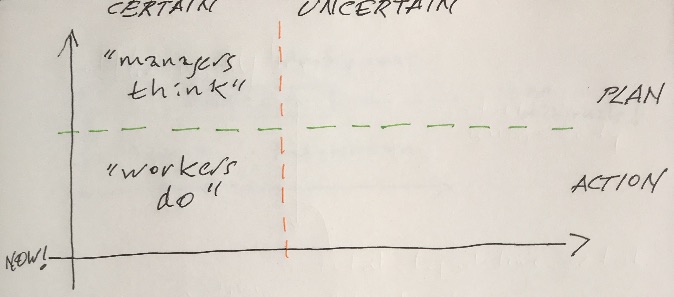
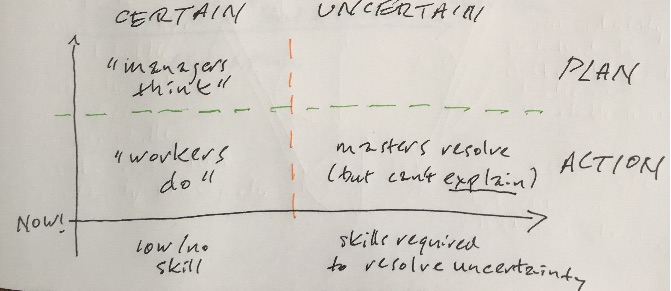
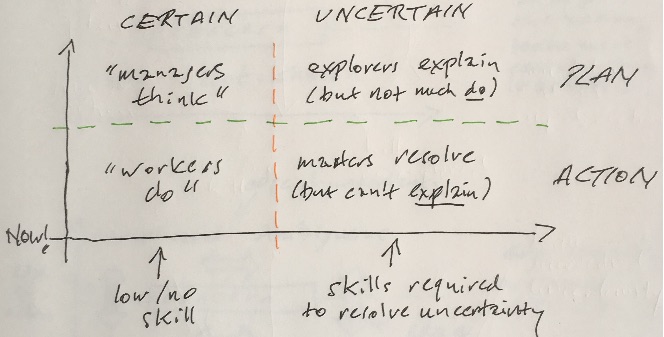
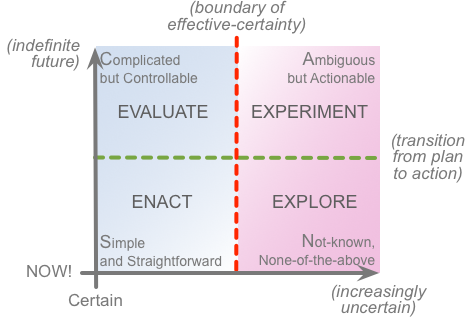
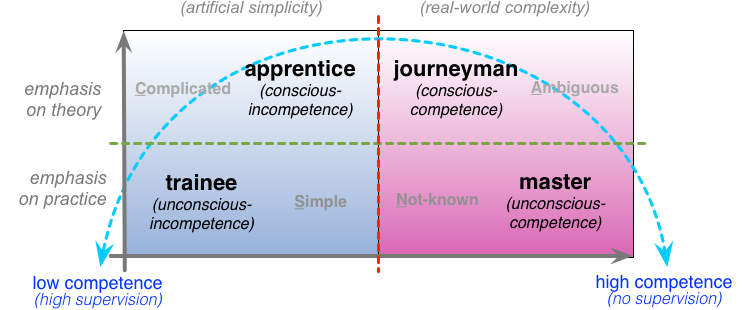
Leave a Reply